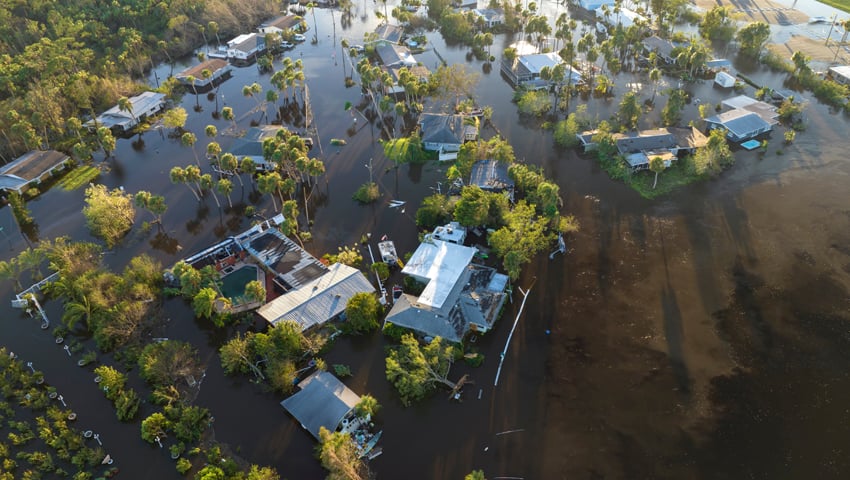- By 2100, as many as 3 billion to 6 billion people may find themselves outside Earth’s liveable regions
- We’re on our way to the potential collapse of natural and socioeconomic systems and a world with unbearable heat and shortages of food and freshwater
- The scientists warn of frequent extreme weather events, food and fresh water shortages, rising seas, more emerging diseases, and increased social unrest and geopolitical conflict
IN ADVANCE of COP28 climate scientists have unleashed their strongest language yet to describe the parlous state of Planet Earth. “Life on planet Earth is under siege. We are now in an uncharted territory.”
They say that “For several decades, scientists have consistently warned of a future marked by extreme climatic conditions because of escalating global temperatures.. […] Unfortunately, time is up.
“We are seeing the manifestation of those predictions as an alarming and unprecedented succession of climate records are broken, causing profoundly distressing scenes of suffering to unfold. We are entering an unfamiliar domain regarding our climate crisis, a situation no one has ever witnessed first hand in the history of humanity.”
The Guardian reported that 20 of the 35 planetary vital signs used to track the climate crisis are at record extremes. Damian Carrington wrote, “Many climate records were broken by enormous margins in 2023, including global air temperature, ocean temperature and Antarctic sea ice extent, the researchers said. The highest monthly surface temperature ever recorded was in July and was probably the hottest the planet has been in 100,000 years.
In their report, the scientists highlight the wildfire season in Canada, which produced unprecedented carbon dioxide emissions. These totalled 1bn tonnes of CO2, equivalent to the entire annual output of Japan, the world’s fifth biggest polluter.
Dr Christopher Wolf, at Oregon State University (OSU) in the US and a lead author of the report, said, “Without actions that address the root problem of humanity taking more from Earth than it can safely give, we’re on our way to the potential collapse of natural and socioeconomic systems and a world with unbearable heat and shortages of food and freshwater.
“By 2100, as many as 3 billion to 6 billion people may find themselves outside Earth’s liveable regions, meaning they will be encountering severe heat, limited food availability and elevated mortality rates.”
Prof William Ripple, also at OSU, said, “Life on our planet is clearly under siege. The statistical trends show deeply alarming patterns of climate-related variables and disasters. We also found little progress to report as far as humanity combating climate change.
“Our goal is to communicate climate facts and make policy recommendations. It is a moral duty of scientists and our institutions to alert humanity of any potential existential threat and to show leadership in taking action.”
The analysis, published in the journal Bioscience, is an update of a 2019 report that has been endorsed by 15,000 scientists.
Prof Tim Lenton, at the University of Exeter in the UK, the co-author, said, “These record extremes are alarming in themselves, and they are also in danger of triggering tipping points that could do irreversible damage and further accelerate climate change.
“Our best hope to prevent a cascade of climate tipping points is to identify and trigger positive tipping points in our societies and economies, to ensure a rapid and just transition to a sustainable future.”
The report states, “We display a diverse set of vital signs of the planet and the potential drivers of climate change and climate-related responses. The trends reveal new all-time climate-related records and deeply concerning patterns of climate-related disasters.
“At the same time, we report minimal progress by humanity in combating climate change. Given these distressing developments, our goal is to communicate climate facts and policy recommendations to scientists, policymakers, and the public.
“It is the moral duty of us scientists and our institutions to clearly alert humanity of any potential existential threat and to show leadership in taking action. This report is part of our series of concise and easily accessible yearly updates on the state of the climate crisis.”
The report concludes that, “The effects of global warming are progressively more severe, and possibilities such as a worldwide societal breakdown are feasible and dangerously under-explored.
“By the end of this century, an estimated 3 to 6 billion individuals – approximately one-third to one-half of the global population – might find themselves confined beyond the liveable region, encountering severe heat, limited food availability, and elevated mortality rates because of the effects of climate change.
“Big problems need big solutions. Therefore, we must shift our perspective on the climate emergency from being just an isolated environmental issue to a systemic, existential threat.
“To address the overexploitation of our planet, we challenge the prevailing notion of endless growth and overconsumption by rich countries and individuals as unsustainable and unjust. Instead, we advocate for reducing resource overconsumption; reducing, reusing, and recycling waste in a more circular economy; and prioritising human flourishing and sustainability. We emphasize climate justice and fair distribution of the costs and benefits of climate action, particularly for vulnerable communities.
“As scientists, we are increasingly being asked to tell the public the truth about the crises we face in simple and direct terms. The truth is that we are shocked by the ferocity of the extreme weather events in 2023. We are afraid of the uncharted territory that we have now entered.
“Conditions are going to get very distressing and potentially unmanageable for large regions of the world, with the 2.6°C warming expected over the course of the century, even if the self-proposed national emissions reduction commitments of the Paris Agreement are met.
“We warn of potential collapse of natural and socioeconomic systems in such a world where we will face unbearable heat, frequent extreme weather events, food and fresh water shortages, rising seas, more emerging diseases, and increased social unrest and geopolitical conflict.”
Read the report, The 2023 state of the climate report: Entering uncharted territory
